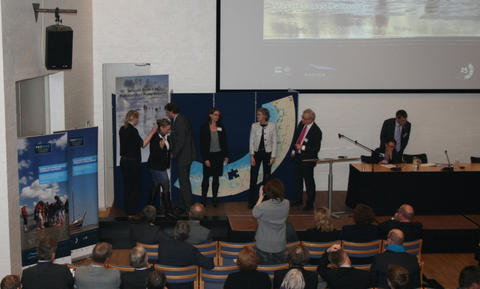






Wadden Sea World Heritage Projects
Wadden Sea Flyway Initiative
In 2009, UNESCO placed the Dutch-German Wadden Sea on the World Heritage List recognising the crucial importance of the site for the survival of migratory birds on a global scale. Germany and the Netherlands now have an enhanced responsibility to strengthen cooperation with other countries for the conservation of migratory birds, especially along the East Atlantic Flyway.
In 2012, the Wadden Sea Flyway Initiative (WSFI) was launched to put this into action. In the first phase, two projects were developed under the initiative that together aim to increase capacity for migratory bird conservation and monitoring along the western seaboard of Africa.
The Wadden Sea Flyway Initiative has already met with national and regional agencies in West Africa in order to develop strong partnerships, including partners engaged in the Conservation of Migratory Birds (CMB) project of BirdLife International and Wetlands International. The close collaboration with partners will improve future cooperation and the vision of a joint management of the East Atlantic Flyway.

Signing WSFI Flyway Vision
More information: http://www.waddensea-secretariat.org/management/projects/wadden-sea-flyway-initiative-wsfi
PROWAD Protect and Prosper – Sustainable Tourism in the Wadden Sea
Each year 10 million overnight guests and 30–40 million day visitors come to the Wadden Sea islands and the mainland coast from Texel in the Netherlands to Skallingen in Denmark. They come for the unique recreational features of the landscape and the opportunities to experience nature. Tourism is one of the most important economic factors for the Wadden Sea region and, with a yearly turnover of 3-5 billion Euro, it also contributes to creating and maintaining jobs in the region.
The PROWAD (link: www.prowad.org) project started in 2011 and ended in June 2015. Funded by the EU via the Interreg IV B North Sea Region Program, it aimed to identify opportunities and perspectives for sustainable tourism in the Wadden Sea, and determine how tourism can benefit from the World Heritage status, while at the same time contributing to its protection.
In 2012 and 2013, local stakeholders from all regions were involved in PROWAD, resulting in a joint transnational strategy on ‘Sustainable tourism in the Wadden Sea World Heritage Destination’, which was adopted in February 2014.
The strategic objectives were:
- To ensure all stakeholders have a transnational understanding and appreciation of the values of the Wadden Sea World Heritage property.
- To ensure stakeholders have responsibility for and contribute to the protection of the ‘Outstanding Universal Value’ through involvement in tourism management and product development.
- To ensure that the tourism sector provides consistent communication and marketing, and promotes the high quality tourism offers of the Wadden Sea World Heritage Destination.
- To ensure nature conservation, tourism and local communities benefit from the World Heritage Status.
A joint action plan has been established to implement the strategy in the period 2014 – 2018.
Further information: www.prowad.org


